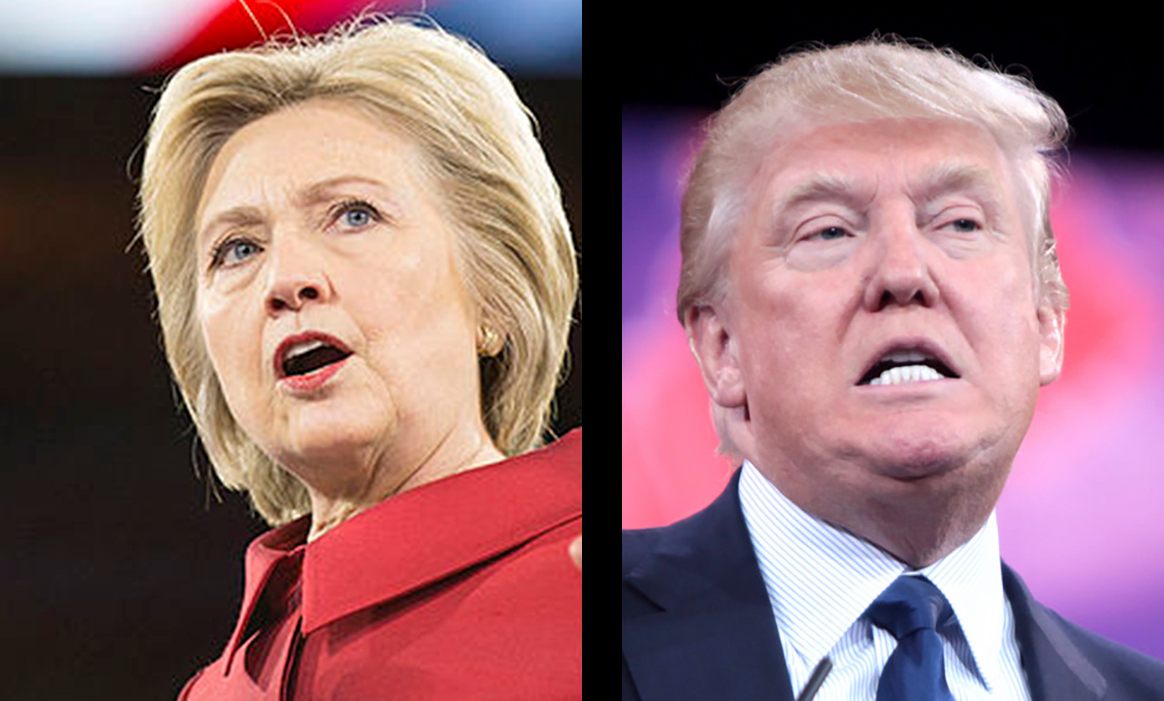We Uncovered the Hidden Patterns in Clinton and Trump’s Most Common Phrases
Linguists dissected over 100,000 words from their speeches.

Hillary Clinton and Donald Trump making speeches. (Photo: left, lorie shaull/cropped/CC BY-SA 2.0; right, Gage Skidmore/cropped/CC BY-SA 3.0)
The Republican National Convention is entering its final night, but people can’t stop talking about the words in Melania Trump’s Monday evening speech—because she borrowed a significant amount of them from a 2008 speech by Michelle Obama.
After journalist Jarret Hill noticed the lifted material and the story spread, the Trump campaign claimed that Melania Trump had simply been using “common words,” and “phrases [Americans] have heard before.”

There has been plenty of analysis of the two candidates’ buzzwords, slogans, and rhetorical stratagems. But this latest scandal made us think—what can we learn from the more ordinary phrases and hidden verbal tics that each of them can’t get away from, the ones they use over and over again, perhaps without even realizing it?
A lot, as it turns out. A quick analysis of Clinton and Trump’s speeches showed that each has certain common phrases they rely on. The differences are telling: Linguists told us that while Clinton’s preferred words tend to be nouns that carry meaning, Trump’s speeches have been filled with grammatically necessary “words that don’t carry any information.”
To unearth the common phrases Clinton and Trump rely on, Atlas Obscura put together two sets of speeches, one for each candidate, all given over the last year. Then we ran the sets through an online text analyzer, which pulled out each candidate’s most commonly used words and phrases, along with the number of times each was said. (In the process, it surfaced the occasional full sentence, like “He wants to ban all Muslims from entering,” or “We’re going to take care of our vets.”)
We ended up with two lists, full of intriguing snippets:
When we talked to linguists about this list, they told us that compiling the most common phrases for each candidate was not the best analytic technique. To compare them more rigorously, we’d need to consider not just which phrases came up most frequently but the number of words in each set of speeches. When looking for differences between Clinton and Trump’s use of language, we needed not ask not just if it’s more common for one of them to use a particular phrase, but if it’s so much more common that it’s distinctive to one or the other of them.
To help us better understand the difference between Trump and Clinton’s use of words, Dr. Viviana Cortes, an associate professor of applied linguistics at Georgia State University, ran a few tests on text from Trump and Clinton’s speeches, examining about 100,000 words from each set.

Trump’s speech at the RNC will be even more scrutinized after his wife’s situation. (Photo: Michael Vadon, CC BY-SA 4.0)
First, she did a simple test, a “type-token ratio,” which looked at how many different words were actually used in each set. Trump had about 4,500 different words; Clinton had about 6,400.
Even this simple test can tell us something about how the two use language. “Clinton’s is much more varied. She uses a wider variety of language than Trump,” says Cortes. “When you have a low type-token ratio, like in the case of Trump, it shows, often, a narrow range of subjects that are spoken about.” That’s not a hard and fast rule, but it can “suggest that the language being used is relatively simplistic,” as Dr. Paul Baker, who Cortes references as the source of this claim, puts it.
Next, Cortes looked at how often Trump and Clinton were using individual words, but she stripped out very common words, like prepositions and articles. Still, at the beginning of those lists, the words that showed up for both candidates were similar—they were words like people, know, want, get, thank. But while both Trump and Clinton had the word country among their most frequently used, only Clinton had America.

Soon, it will be Clinton’s turn at the convention podium. (Photo: Qqqqqq, CC BY-SA 3.0)
More revealing was an analysis of “keyness”—a test of which words, statistically, had a greater likelihood of belonging to one of the two sets of speeches. Here, there was a dramatic difference. Clinton had all words that carried information: families, work, economy, together, American, women, workers, future, create, children. Trump had almost no words that carry information. Instead, the words that he was statistically more likely to use than Clinton were: going, are, they, I, you, it, they.
Last, Cortes looked at longer expressions, mostly of 3, 4, or 5 words, that the candidates used frequently. Among those phrases, Clinton had more expressions with the words we, think and want. Trump’s expressions relied on going to: they are going to, we are going to, we are going to have, going to be.
Looking at these phrases, Cortes was also surprised to find a couple of longer expressions come up frequently in the text of Clinton’s speech: to break down all the barriers and works for everyone not just those at the top. People don’t usually repeat phrases that long and heavy when they’re speaking; it’s more common in writing. (And perhaps this reflects Clinton’s skill at delivering written speeches vs. Trump’s skill at speaking extemporaneously.) The longest frequent expressions that Cortes surfaced from Trump was we are going to take care of and we are going to build a wall.
Political analysts also saw marked differences in the sets. “I think there are a couple of key distinctions that you can see, even when you look at brief three or four-word snippets,” says Dr. Stephen J. Farnsworth, director of the Center for Leadership and Media Studies at the University of Mary Washington. To his eye, Clinton’s most common phrases tended to be “more inclusive”—speaking about America as a whole, with “we”s more prominent than “I”s.
For Farnsworth, Trump’s most striking hallmarks were somewhat conflicting—his tendency to look backwards, with phrases like “in the history of” and “make America great again,” and then his many “going to”s, which suggest the opposite. Farnsworth sees this second trend as a function of Trump’s outsider status: “You have to talk about the future if you’re Donald Trump, because you can’t talk about your campaign as the continuation of what Republicans have said and done in the past,” he says.
“So Trump is a weird contradiction here,” says Farnsworth. “He encourages Americans to look to the past, but at the same time, he really wants to make a pretty clean break from Republican policies of the past.”
When Dr. Peter Lawler, the Dana Professor of Government at Berry College, looks at these phrases, he doesn’t see much to compare. “It’s a sea of similarities,” he says. In statements like “we’re going to win,” and “make America great again,” he sees Trump emphasizing the country’s civic identity, while phrases like “break down all the barriers” and “no matter what zip code they live in” show Clinton underscoring diversity. If there’s a difference there, he says, “it’s kind of a branding difference.”
To him, these repeated phrases, as well as Melania’s plagiarism, say more about the electorate than the candidates. “There is a certain sense in which all political rhetoric, and all rhetoric generally, is above words now,” he says. “If we had minimal civic literacy, politicians, like great jazz artists, would sample things said by presidents and major works of literature and people would know it.” Instead, he says, “everything has been reduced to focus-group approved phrases.”
Farnsworth ended up with a similar, if more generous, diagnosis: “A lot of these comments are like punctuation,” he says. “Politicians, no matter their party, are going to have good things to say about the U.S., and they will offer up plans for the future.”







Follow us on Twitter to get the latest on the world's hidden wonders.
Like us on Facebook to get the latest on the world's hidden wonders.
Follow us on Twitter Like us on Facebook